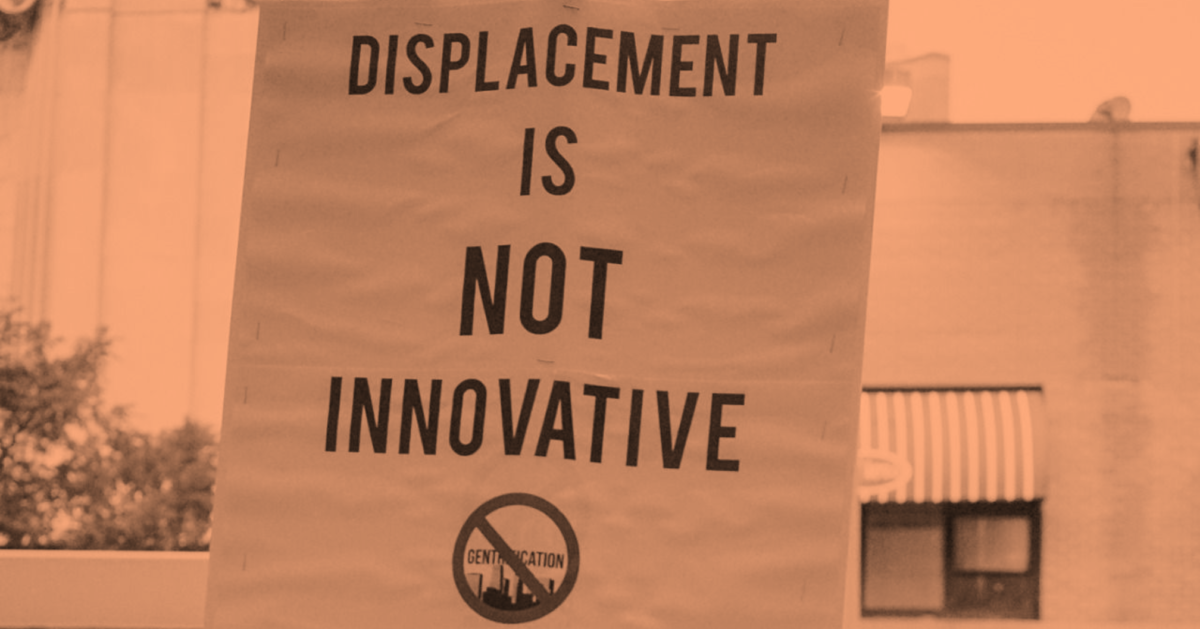
Last week, City of Austin officials proudly proclaimed they had passed a transformative, progressive budget for 2021—a $4.2 billion package where equity “encompasses the full breadth of city services and functions,” to borrow a line from its introduction.
Unfortunately, those words ring hollow when it comes to fighting the displacement of Austin’s current residents, one of the most pressing social-justice issues we face today.
City Hall has generated three major anti-displacement reports over the last four years, each showing growing numbers of Austinites driven out of their neighborhoods by rampant gentrification. But its 2021 budget contains no strategic focus on displacement, sets aside nearly no funding or staffing for anti-displacement initiatives, and puts in place no metrics or indicators to measure the problem. None of its “outcome categories” (or their subcategories) reference the prevention of displacement. The city also lists more than 100 important indicators of success on its Strategic Performance Dashboard, but none include displacement prevention.
In other words, it doesn’t look like the City of Austin plans on doing anything in 2021 to substantially address one of our most urgent problems: The gentrification of working-class neighborhoods and the destruction of community that it causes. In its new budget, the city appears to conflate the issue with homelessness—devoting $20.5 million toward combatting the “displacement” of homeless residents, for instance. Homelessness is indeed a pressing problem, but we believe it’s time for the city to start paying attention to Austinites who have homes but are threatened with gentrification-related displacement. The city should be vigorously funding specific anti-displacement programs, such those recommended in The People’s Plan and the city’s own task-force reports.
Effective anti-displacement programs are designed for people who are threatened with having to move from their homes as a result of gentrification and redevelopment, not for people who are living on the streets. Programs that address homelessness often focus on mental health, substance abuse, and employment-related issues. Anti-displacement programs are different: They require their own funding, their own approaches, and their own staff of individuals with specialized expertise to counter redevelopment market pressures. Local advocates have long urged City Hall to create a standalone anti-displacement unit, but city officials have ignored these recommendations.
This lack of interest is nothing new for City Hall. There is an abysmal gap between the way our elected officials have talked about institutional racism and their willingness to stop (or even slow) displacement trigged by city-promoted redevelopments. The 10-1 city councils have talked about preventing displacement in Austin’s vulnerable Eastern Crescent, for example, but they have done next to nothing about it, as the continuing exodus of the area’s longtime residents attests. Sadly, displacement has worsened after 10-1’s enactment of geographic representation, which many of us had hoped would help address Austin’s inequities.
For years now, Austin neighborhoods have appeared on lists of the nation’s most gentrified areas, but our elected officials have dithered. Now it looks like they’ll be doing more of the same in 2021. What is equitable, anti-racist, or progressive about that?
Contact Mayor Steve Adler and your representative on the Austin City Council using the contact information below, and tell them it’s time for them to take meaningful action to stop displacement in the Eastern Crescent and throughout our community. Check this map if you aren’t sure which council member represents you.
Together we can build an Austin for everyone!
Mayor Steve Adler:
steve.adler@austintexas.gov | 512-978-2100
Natasha Harper-Madison (District 1):
natasha.madison@austintexas.gov | 512-978-2101
Delia Garza (District 2):
delia.garza@austintexas.gov | 512-978-2102
Sabino Renteria (District 3):
sabino.renteria@austintexas.gov | 512-978-2103
Greg Casar (District 4):
gregorio.casar@austintexas.gov | 512-978-2104
Ann Kitchen (District 5):
ann.kitchen@austintexas.gov | 512-978-2105
Jimmy Flannigan (District 6):
jimmy.flannigan@austintexas.gov | 512-978-2106
Leslie Pool (District 7):
leslie.pool@austintexas.gov | 512-978-2107
Paige Ellis (District 8):
paige.ellis@austintexas.gov | 512-978-2108
Kathie Tovo (District 9):
kathie.tovo@austintexas.gov | 512-978-2109
Alison Alter (District 10):
alison.alter@austintexas.gov | 512-978-2110
You may send a single email to the mayor and all council members using this form.